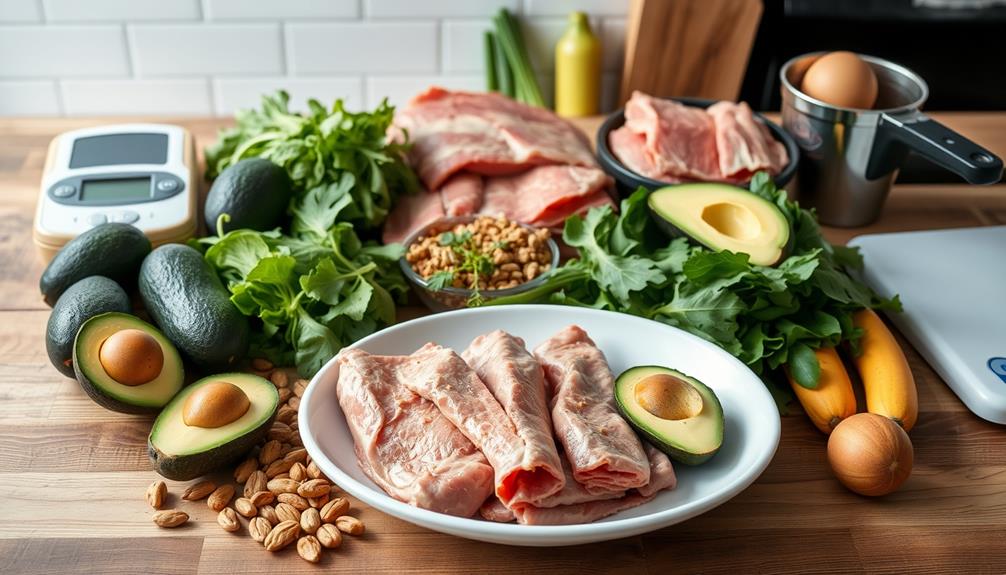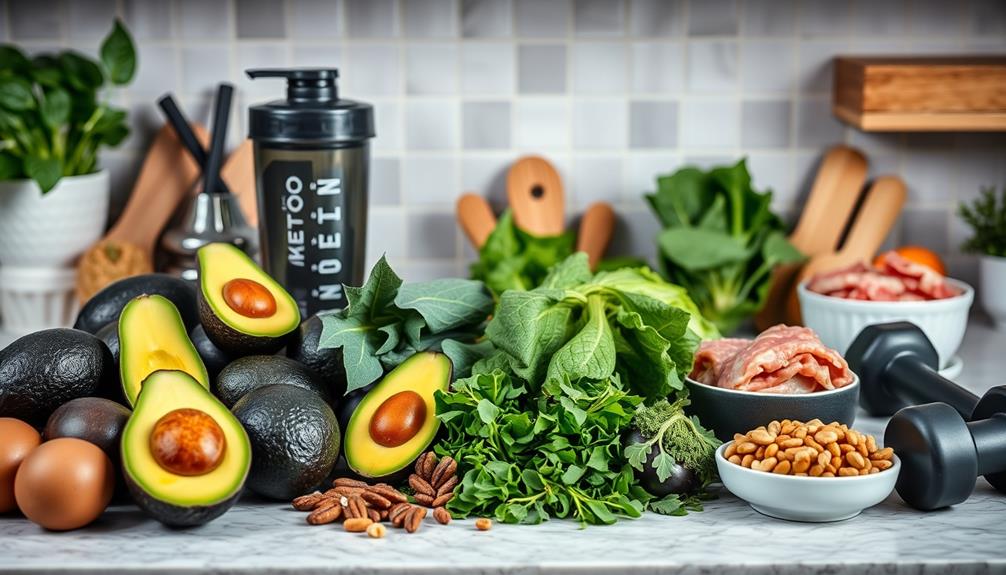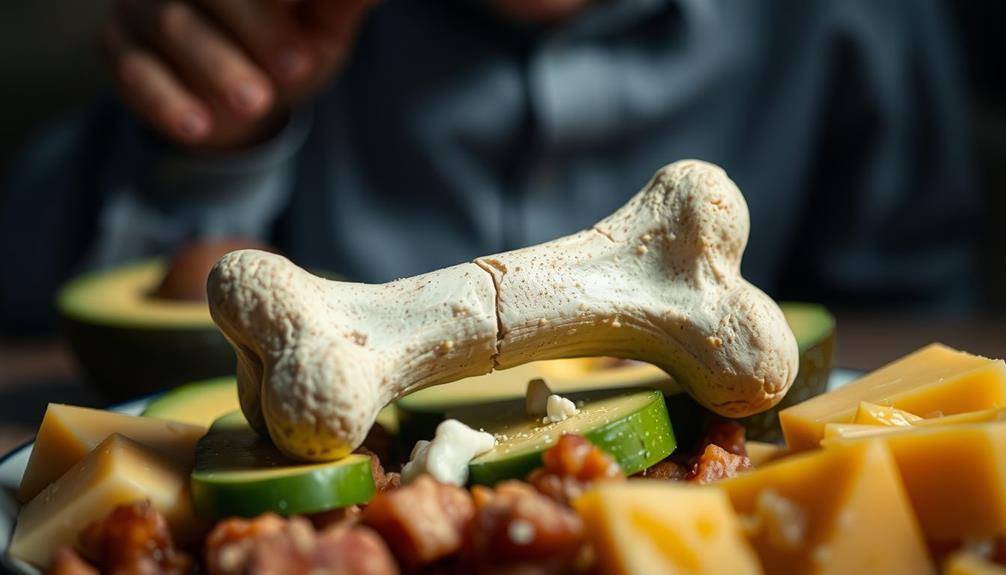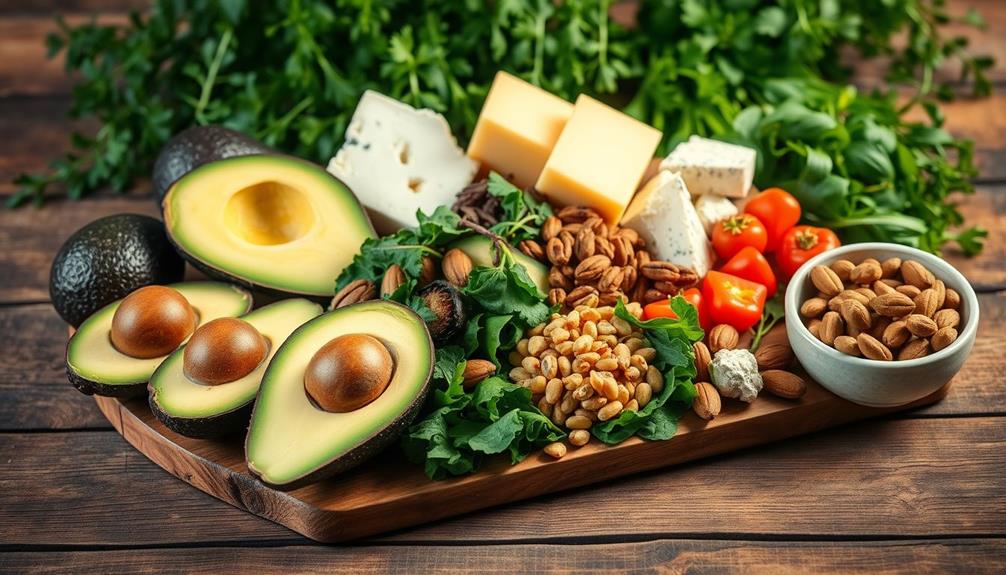To effectively gain muscle on a keto diet, focus on a macronutrient ratio of 70-75% fat, 20-25% protein, and 5-10% carbs. Keep your carb intake below 50 grams daily to maintain ketosis, and aim for a protein intake of 1.6 to 2.2 grams per kilogram of body weight. Incorporate strength training, particularly compound exercises, at least twice a week. Make certain to stay hydrated and guarantee electrolyte balance to enhance recovery. If you maintain a caloric surplus and monitor progress, you'll optimize muscle gains while following keto—more tips on managing this lifestyle are just around the corner.
Key Takeaways
- Follow a macronutrient ratio of 70-75% fat, 20-25% protein, and 5-10% carbs to support muscle gain on keto.
- Aim for a protein intake of 1.6 to 2.2 grams per kg of body weight to enhance muscle growth.
- Engage in strength training with compound exercises at least twice a week for optimal muscle development.
- Maintain a caloric surplus of 350-450 calories above maintenance to promote muscle gain effectively.
- Stay hydrated and consider supplements like creatine and BCAAs to support recovery and performance during workouts.
Understanding the Keto Diet

The ketogenic diet, often referred to as keto, is a high-fat, low-carb eating plan designed to shift your body into a metabolic state called ketosis. In this state, your body burns fat for fuel instead of carbohydrates.
Typically, the keto diet consists of about 70% fat, 20-25% protein, and only 5-10% carbohydrates. By consuming fewer than 50 grams of carbs daily, you can usually enter ketosis within 2-4 days, leading to rapid weight loss and improved fat utilization for energy. This approach not only aids in weight management but also incorporates essential nutrients, promoting overall health, including effective strategies for weight loss.
Originally developed to treat epilepsy, the ketogenic diet has gained popularity for its potential benefits in weight loss, better lipid profiles, and blood sugar regulation.
Adhering to the keto diet means focusing on whole, unprocessed foods while avoiding sugar and grains, which can help support overall health and muscle retention during fat loss.
For those looking to support muscle gain, maintaining adequate protein intake is important. Aim for around 1.6 to 2.2 grams of protein per kg of body weight while ensuring a caloric surplus.
This approach is essential for optimizing exercise performance and effectively building muscle on keto.
Building Muscle on Keto

Building muscle on a ketogenic diet can seem challenging, but it's absolutely achievable with the right approach. To effectively build muscle, focus on the following key areas:
1. Protein Intake: Aim for 1.4 to 2.0 grams of protein per kilogram of body weight daily. This guarantees you get enough amino acids for muscle repair and growth.
Additionally, incorporating nutrient-rich foods, such as high fiber and vitamin content from vegetables like beetroot, can enhance overall health and support muscle development.
2. Caloric Surplus: Confirm your caloric intake is about 350-450 calories above your maintenance level. This surplus is essential for muscle growth while adhering to the ketogenic diet.
3. Strength Training: Consistently engage in strength training, emphasizing compound exercises like squats and deadlifts. These movements target multiple muscle groups, leading to significant muscle growth.
Macronutrient Management

Successfully managing your macronutrients is essential for muscle gain on a ketogenic diet. A typical macronutrient ratio for this diet is about 70-75% fat, 20-25% protein, and 5-10% carbs. To stay in ketosis, you should keep your carb intake below 50 grams daily. For ideal results, aim for a protein intake of 0.7-1.0 grams per pound of body weight. This helps support muscle gain while avoiding gluconeogenesis that could disrupt ketosis.
Additionally, understanding common financial terms can aid in budgeting for your nutrition and fitness needs.
When calculating your calories per day, determine your protein and carb needs first. For instance, in a 2,500 calorie diet with 150 grams of protein (600 calories) and 50 grams of carbs (200 calories), your fat intake should make up approximately 1,700 calories (or 190 grams).
Timing your carb intake around resistance training can enhance your performance; consider a targeted ketogenic diet that allows a small amount of carbs pre- or post-exercise.
Lastly, don't forget the importance of hydration and electrolyte balance, as reducing carbs can lead to water loss and electrolyte depletion, which impacts your overall performance and muscle recovery.
Training and Recovery

To maximize muscle gain on a keto diet, it's crucial to focus on resistance training, aiming for at least two sessions each week.
Incorporating practices such as gentle stretching before bedtime can also help relax your muscles and enhance recovery.
Quality sleep plays a key role in recovery, so aim for 7-9 hours each night to support your muscle repair.
Additionally, consider supplementation to enhance your performance and recovery between workouts.
Resistance Training Importance
Resistance training plays an essential role in muscle gain while following a ketogenic diet, as it not only stimulates muscle growth but also enhances overall strength.
Additionally, focusing on strength training can be particularly beneficial in a world where AI Cybersecurity Jobs are on the rise, as it fosters discipline and consistency.
To maximize your results, focus on these key aspects:
- Compound Exercises: Incorporate movements like squats, deadlifts, and bench presses. These exercises engage multiple muscle groups, promoting overall strength development and efficiency in your training sessions.
- Progressive Overload: Gradually increase the weights or resistance during your workouts. This principle is essential for continuous muscle adaptation and growth, ensuring that your body consistently faces new challenges.
- Rest and Recovery: Prioritize adequate rest, including 7-9 hours of quality sleep each night. This is crucial for muscle repair and hormone regulation, which enhances performance in subsequent training sessions.
Sleep and Recovery
During your journey on the ketogenic diet, prioritizing sleep and recovery is essential for maximizing muscle gains. Quality sleep—aiming for 7-9 hours each night—supports vital processes like muscle repair and hormone regulation. The release of growth hormone during sleep greatly aids muscle growth, while insufficient sleep can elevate cortisol levels, hindering recovery and promoting fat storage.
To enhance your sleep quality, consider implementing relaxation techniques such as meditation or deep breathing. Also, practicing good sleep hygiene can lead to better recovery and overall performance. Here's a quick reference table to help you focus on sleep and recovery:
| Key Factor | Importance | Tips for Improvement |
|---|---|---|
| Sleep Duration | 7-9 hours for recovery | Set a consistent sleep schedule |
| Quality Sleep | Supports muscle repair | Create a comfortable sleep environment |
| Hormone Regulation | Growth hormone release | Limit screen time before bed |
| Cortisol Levels | Affects recovery negatively | Practice relaxation techniques |
| Sleep Hygiene | Contributes to overall performance | Maintain a clean and dark bedroom |
Supplementation for Performance
Maximizing muscle gains on a ketogenic diet involves not only prioritizing sleep and recovery but also incorporating effective supplementation for performance.
The right supplements can enhance your resistance training, boost muscle recovery, and help you achieve your muscle gain goals. Here are three key supplements to take into account:
- Creatine: This well-researched supplement improves strength and muscle gain. A typical dosage of 3-5 grams per day can enhance your performance during resistance training sessions.
- Protein Powders: Whey or casein protein provides a convenient, high-quality source of protein essential for muscle repair and growth. They help you meet daily protein intake while keeping carbs low.
- BCAAs: Taking 5-10 grams of branched-chain amino acids before or after workouts can reduce muscle soreness and support muscle recovery, making them a valuable addition to your regimen.
Additionally, think about MCT oils for quick energy and electrolytes to maintain hydration and prevent cramps, especially in the early stages of the ketogenic diet.
These supplements can greatly enhance your overall performance and support your muscle gain journey.
Supplements for Muscle Gain

When it comes to optimizing muscle gain on a ketogenic diet, incorporating the right supplements can make a significant difference. One of the best ways to guarantee you're getting high-quality protein is through protein powders like whey or casein. These can effectively support muscle repair and growth.
Creatine monohydrate is another powerful addition; it enhances strength and muscle mass by improving your performance during resistance training.
Don't overlook branched-chain amino acids (BCAAs), either. They can help with muscle recovery and reduce soreness, allowing you to maintain workout intensity and frequency.
Omega-3 fatty acids, often found in fish oil supplements, can support joint health and combat inflammation, which is essential for recovery during intense training sessions.
Lastly, consider electrolyte supplements that include sodium, potassium, and magnesium. These are critical for maintaining hydration and preventing cramps, especially during the adaptation phase of the ketogenic diet.
Common Challenges and Solutions

You might find managing protein intake and overcoming keto adaptation to be significant challenges on your muscle gain journey.
It's essential to balance your protein sources while ensuring you're getting enough nutrients to support your workouts.
Let's explore some practical solutions to tackle these issues effectively.
Protein Intake Management
Steering protein intake on a ketogenic diet can present unique challenges, especially when trying to build muscle. To support muscle gain, you need to maintain adequate protein levels, ideally around 1.6 to 2.2 grams per kilogram of body weight.
Here are some common challenges and solutions to make sure you meet your protein goals:
- Caloric Intake: The high-fat content of a ketogenic diet can lead to increased satiety, causing you to eat fewer calories overall. Tracking your macros can help you stay on target.
- Protein Distribution: Consuming all your protein in one meal can hinder muscle protein synthesis. Instead, distribute your intake evenly throughout the day to promote consistent muscle repair and growth.
- Quality Sources: It's crucial to focus on high-quality protein sources. Incorporate lean meats, fatty fish, and eggs into your diet.
If you're struggling to meet your protein needs, consider protein supplements like whey or casein, which can be especially effective post-workout for best recovery.
Overcoming Keto Adaptation
Adjusting to a ketogenic diet can present hurdles, especially in the early stages known as keto adaptation. You might experience symptoms like fatigue, headaches, and irritability—often referred to as the "keto flu." These can last up to four weeks as your body shifts from burning carbs to fat for energy.
To combat these symptoms, focus on hydration and increase your intake of sodium, potassium, and magnesium to maintain electrolyte balance.
To keep your energy levels up during workouts, consider timing your carbohydrate intake around training sessions. This targeted approach can enhance performance without derailing your low-carb lifestyle.
Gradually increasing your fat intake while monitoring your protein levels is essential, ensuring you have enough energy for workouts and muscle recovery while staying in ketosis.
Tracking your macronutrient ratios can help you navigate the challenges of keto adaptation. Being mindful of food choices not only prevents boredom but also supports your muscle-building efforts.
Embrace this journey with patience, and you'll find that overcoming these initial hurdles can lead to great rewards in your muscle gain endeavors.
Frequently Asked Questions
Can I Build Muscle on a Keto Diet?
Yes, you can build muscle on a keto diet. Focus on adequate protein intake, consistent strength training, and a caloric surplus. With the right nutrition, you'll support muscle growth effectively while following a low-carb regimen.
What Should I Eat to Bulk up on Keto?
Did you know that consuming 1.6 to 2.2 grams of protein per kg of body weight can considerably enhance muscle growth? Focus on lean meats, fatty fish, eggs, and healthy fats while keeping carbs low.
Do Any Bodybuilders Use Keto?
Yes, many bodybuilders use the ketogenic diet. You can effectively build muscle while following it, focusing on high protein and healthy fats, limiting carbs, and ensuring you maintain a caloric surplus for best results.
Can You Get Ripped on a Keto Diet?
Yes, you can get ripped on a keto diet by maintaining a caloric deficit, focusing on high protein intake, and incorporating resistance training. Just make sure you adapt well and stay hydrated for peak performance and recovery.
Conclusion
To sum up, the keto diet can successfully support muscle gain when you manage your macronutrients and focus on training. For instance, imagine John, who switched to keto while weightlifting. Within months, he noticed significant muscle growth and fat loss by prioritizing protein and healthy fats. By embracing the keto lifestyle and overcoming challenges, you too can achieve impressive results, transforming your body while fueling your workouts effectively. Don't hesitate – start your keto journey today!









